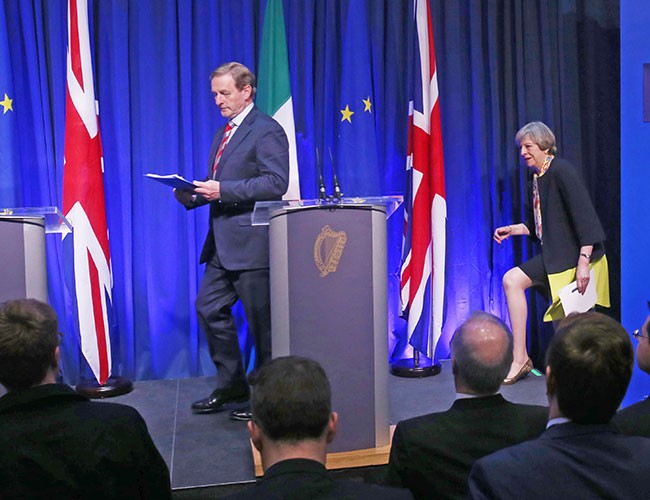3 April 2017 Edition
Irish Government needs to negotiate directly

• Border tariffs and new procedures will hit producers and consumers across all of Ireland, North and South
Irrespective of what the EU does, the Irish state must begin separate negotiations directly with Britain on those two issues of major concern – trade and the Border
WHILE commentators and politicians alike agree that the British withdrawal from the European Union (“Brexit”) poses major threats to Ireland, in terms both of trade and in respect of the Border, the Fine Gael/Independent Government in Dublin stands frozen like a rabbit caught in the headlights.
Fine Gael, Fianna Fáil and Labour reassure themselves that ‘Europe’ understands our concerns, that we (in the 26-County state) will be part of ‘Team Europe’ in the post-Brexit negotiations, and that everything will be alright on the night.
In fact, even though the EU may well understand Irish concerns, there is no indication whatsoever that these concerns will form a red-line issue for the negotiators.
Indeed, Michel Barnier, the head of the EU negotiating team, has made it clear that Britain must get a worse deal outside the European Union than it would get inside. This, of course, is to make it clear to any state that wants to follow Britain’s example that you will suffer some dire punishment if you break with the EU bloc.
This punitive attitude poses great threats for Ireland.
First of all, our country has been divided against the will of the majority of the Irish people, and it is unacceptable that the free movement of people and goods between North and South would be interfered with at this stage.
But, secondly, Britain is the largest single trading partner of the 26-County state, accounting for 14% of exports and 26% of imports. While the rest of the EU combined accounts for 39% and 34% respectively, the rest of the world (excluding Britain), accounts for 47% and 40%.
In agriculture, the situation is even more precarious with some 50% of 26-County agricultural produce being sold on the British market.
If the EU imposes a 50% tariff on British agricultural produce going into the EU (as Michel Barnier is threatening) Britain will retaliate in like manner.
If we leave it to ‘Team Europe’, such a tariff would have a devastating effect on Irish agriculture and the economy of rural Ireland.
No Irish Government worthy of the name can just sit back and hope for the best, as Kenny & Co are doing now.
The fact is that the only people who will make Irish concerns a red line issue are the Irish people and our political representatives.
In other words, irrespective of what the EU does, the Irish state must begin separate negotiations directly with Britain on those two issues of major concern – trade and the Border.
These negotiations should have the aim of ensuring that no ‘hard border’ will exist in Ireland and that Ireland as a whole shall have a special status vis-à-vis the EU to ensure no interference with free movement of goods and people, North and South.
Such special status could be by way of associate membership, or a protocol excluding us from any negative provisions of the final Brexit deal – pending, of course, a realignment of the EU itself and our relationship with it.

• Taoiseach Enda Kenny needs to lead at more than media events with Prime Minister Theresa May
It is particularly enraging therefore that the White Paper produced by the European Commission in respect of the future of the EU – debated at the Rome Summit at the end of last month – should have been totally ignored in official comment.
But this White Paper includes the option that the existing EU should be shorn of all its state pretensions, its European Army, single foreign policy, common defence and security policy, and be confined to being purely a trading and economic co-operation area.
It is obvious that this option is more in the interests of Ireland than the Commission’s preferred way forward – accelerated progress to a federal super-state.
Instead of going down the road of acquiescent ruin, we should negotiate a deal with Britain that preserves our existing sovereignty, protects our existing trade and opens up the road to Irish reunification.
This should be presented to the EU as a red-line commitment which must be fulfilled, whatever Barnier and the Commission bureaucrats want.
These issues may not be important in Warsaw, Budapest, Prague or Bratislava but they are vital for the Irish people.
Do we have a government that is capable of or willing to fight for Irish interests, or are the crowd in Government Buildings just messenger boys for the EU bosses?




